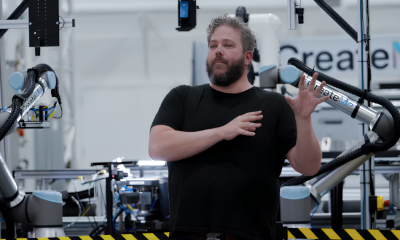Interviews
Dimitris Vassos, CEO, Co-founder, and Chief Architect of Omilia – Interview Series

Dimitris Vassos is the CEO, Co-founder, and Chief Architect of Omilia, a global conversational intelligence company that provides advanced automatic speech recognition solutions to companies and organizations in North America, Canada, and Europe. Dimitris has significant experience in the field of applied speech and artificial technology, specifically, natural language understanding (NLU), speech recognition, and voice biometrics.
What initially attracted you to AI?
Human-Machine interfaces have mesmerized me since I was a child. In 1984, I had one of the first home computers. I remember I had programmed it to control our home lighting using sound recognition. Back then, there was no speech recognition technology available, so I had it recognize patterns of sound (i.e. clapping).
During my studies, I learned about speech signal processing, and immediately saw this as the most promising human-machine interface technology. I had a mission to make machines understand humans using natural language understanding.
What was the inspiration behind founding Omilia?
My first job was with IBM in its voice solutions unit. I was developing and delivering voice interaction solutions for automated telephone inquiries. Very soon, I realized that technology and products available could be made better. After a few years of frustration, I decided to take things into my own hands. That’s when I met my partner, Pelias, and we founded Omilia with a mission to re-invent the voice automation industry.
What are some of the solutions currently offered by the Omilia Conversational AI?
Omilia provides human-like human-to-machine communication experiences and technologies in to help companies improve the customer care experience. Our main solution offerings are:
- Conversational AI Self-Service for Customer Care, over both voice and text channels
- Customer ID & Authentication using Voice Biometrics
- Transcription Services focused on Customer Service
The Omilia Cloud Platform (OCP) offers ready-to-consume micro-services that enable companies to integrate our state-of-the-art capabilities into their customer care processes, while offering critical solutions for those companies that wish to benefit from our team’s extensive experience in deploying large-scale conversational AI solutions for over 15 years now.
Our differentiator in the market is that our capabilities have evolved over time and with that experience are ahead of the curve, offering robust solutions that deliver real business value.
Could you discuss some of the speech recognition challenges that may be faced from having a global clientele speaking in different languages and with different accents/pronunciations?
A language is a system of communication defined by people and influenced by their country or community. As such, accents and pronunciations become a significant part of any language. So, developing a language for AI technology involves collecting a large sample of spoken language from a group of native speakers and using it for training our AI models. It requires considerable effort to perform this process. Our diverse clientele propelled us to strategically invest in building out capabilities in various languages. Today, our solutions support over 24 languages, and the upfront investment and assets that we have accumulated are very significant.
Why do you believe that voice biometrics is important?
In customer service, perhaps the most challenging part of a caller’s experience is authentication – the process by which a customer representative verifies the identity of the caller. We all have called in various contact centers and have spent time answering trivial questions that are designed to prove our identity. One facet of the problem is that today, such personal information is easily discoverable by anyone making security of authentication processes alike compromised. At the same time, the authentication process itself is often very tedious, lengthy and adds frustration to the customer experience.
Voice Biometrics solves this problem. While one’s voiceprint is not 100% unique and secure, it is significantly more accurate and secure than knowledge-based information. When done right, voice biometrics can provide a more satisfactory customer experience. For me, “done right” is defined as seamless for the customer.
At Omilia, good tech is invisible tech. This is the design principle that guides our products and services. With our deepVB solution, we are achieving ultra-high accuracy rates, from the first few seconds of the customer speaking, and without any need for the customer to say anything specific. It is an innovative breakthrough that is solving the problems of traditional biometric deployments with tedious enrolment processes and lengthy speech samples. Omilia’s Voice Biometrics works seamlessly across all voice channels.
Voice Biometrics is an important ingredient in the customer service experience, making the authentication process seamless, and thus improving overall customer experience and business value.
Voice biometrics has often been poorly deployed in the marketplace, how does Omilia tackle this challenge?
The most common mistake when deploying voice biometric services is designing the customers’ experience around the limitations of the technology. This is wrong. If customers were to use the technology exactly in the way it was designed, without deviations, it would perform well, but the reality is that customers have their own objectives they are set to accomplish on a call and technology can either meet those objectives, or not. The solutions must be designed around the customer experience, not the other way around.
So far in the market, most biometric deployments in customer service have not delivered the benefits they promised. In contact centers, most deployments have relied upon legacy technology, which hasn’t kept pace. As with voice self-service, at Omilia we persistently refuse to settle for anything less than stellar customer experience. So, we set out to define what such an experience would look like and what the technology enabling that experience should be able to do. The result is our deepVB engine, which is at the core of our services and solutions, and which not only leverages the latest in Deep Learning, but also works hand-in-hand with our Speech Recognition engine and Dialogue Manager, to smartly get informed from the context of the interaction. We have solved the Conversational Authentication problem, not just voice biometrics.
Being able to understand intent in speech analytics can be tricky, how is Omilia able to do this so successfully?
The ancient Greeks had a saying “good things are acquired by expending labor”. This is true for everything we do at Omilia, and it is certainly true for our Natural Language technology. For more than 15 years now, we have been painstakingly designing, building and refining a unique approach to Natural Language Understanding (NLU), which is not a singular technology, but rather a combination of multiple technological approaches, all fused together to deliver Conversational NLU for Customer Service. Conversational AI companies are continuously looking for the best Machine Learning algorithm to solve for NLU. However, most of the time, what makes a difference is not the best algorithm in the lab. What has rendered results for us is the approach of going the extra mile to find solutions to real world problems, not technological ones, utilizing the best tools.
I often remind our team of how long it took us to get here. And develop the technological capabilities we have. We were successful because we were sought out to solve the problems that companies and their customers are experiencing, as opposed to simply looking at the technology.
Conversational AI is becoming a hyper competitive industry, what do you believe differentiates Omilia from competing products?
The field of Conversational AI is very broad and is applied in different ways in different markets and industries. In practice, only a small handful of providers can deliver sophisticated solutions that can compete with the most advanced solutions in the space in which Omilia is active. Omilia is one of those providers.
Omilia’s biggest strengths are voice and dialogue. We can facilitate real-time, unconstrained, conversational dialogues with customers over various communication channels, with ultra-accuracy and stellar customer experience. We have been doing so for many years, and our experience has positioned us to achieve the highest number of conversational voice self-service solution deployments in the world to this day.
The “Forrester New Wave” 2019 report assessing customer service in Conversational AI found that Omilia’s strongest product differentiation is its omnichannel, voice and speech, vertical specialization (pre-trained models for specific industries) and security and authentication which enables seamless identification and authentication of customers, which otherwise is a point of high friction for customer service.
What type of enterprises are using Omilia products?
Omilia works in over 16 countries serving global companies in sectors with a large volume of customer service interactions such as finance, telecom, insurance, healthcare, energy, retail, utilities, public sector and transportation, to name a few. Omilia’s ability to achieve 96% semantic accuracy, across 24 ASR languages and do so at scale while ensuring consumer fraud prevention, makes Omilia one of the few companies that can meet the high customer service demand with human-like conversational experience, saving companies millions of dollars.
Omilia’s products fit all enterprises, big or small. We are serving mid-market customers with our cloud-based offering of OCP miniApps®, which we consider a real disruption in the Conversational AI space. We utilize sophisticated conversational voice and text self-service for a company of any size, at the click of a button and with zero-coding. Now, any company can provide the highest level of sophistication in customer service that previously only the large enterprise customers could afford.
Thank you for the interview, readers who wish to learn more should visit Omilia.












